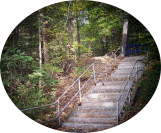PART THREE -
Life's awakening
Chapter 24
The years Neil worked in the typewriter
shop gave him a unique education. It was certainly the kind Neil could
never have secured anywhere else. For the first time, he was thrown into
contact with military personnel and civilian employees with different
levels of intelligence, backgrounds, and abilities. They naturally had
different ethical and moral values as well. Neil was now living in a city
which, due to World War II, was saturated with people representing many
nationalities, languages, races, cultures, and religions. Under these
conditions his horizons widened almost overnight, and his perceptions of
human nature changed greatly. Neil's provincial attitude, nurtured in
Shamokin, was clearly out of place in cosmopolitan Washington, D.C. Old
taboos, while not entirely abandoned, lost much of their previous
inviolability. Things he would never dream of doing back home, Neil could
do here, clothed in the anonymity of big city life. Neil discovered that
the strict moral code he had been taught to obey without question, was
broken here every day and no one cared.
Neil's intellect found plenty of
nourishment. Thoughts he now expressed, political views he held, and his
reaction to different social and economic problems were received
tolerantly. They were judged on the basis of facts rather than some
predetermined attitude. To Neil, the conversations were stimulating,
enjoyable and constructive. They were no longer stereotypes of outdated
views of little value in the ever-changing world. The lessons Neil heard
in Washington's Sunday Schools were taught by distinguished men who had
more to give than the often humdrum "question and answer" sessions offered
by their Shamokin counterparts. The brilliant sermons Neil heard in church
stressed faith, love, and forgiveness instead of sin, hell fire, and
eternal damnation. There were always free concerts to go to, free lectures
to enjoy, and free seminars to attend. No wonder Neil's brain filled with
information he could have learned nowhere else.
Neil's attitude toward his handicap
began to change too. Although he still harbored some of the resentment he
had felt as a child, he realized that he had at last become a productive
human being and not just a parasite. Even though Neil had every reason to
believe that if he stayed in Nescopeck his business there would have
flourished and he would have become productive too, there was a subtle
difference. Neil sensed that being paid a regular salary by an employer
made his job in the Pentagon a bit special and something to be proud of.
Another reason for his changed attitude was that Neil could see with his
own eyes many other handicapped men and women working day after day in all
kinds of jobs and under all sorts of conditions. This would have been
impossible in Shamokin or Nescopeck, where even normal job opportunities
for able-bodied persons were few and far between. Neil's main object in
life was to do his job. There was a six-month probationary period, and
during that time, Neil did not take a single hour off. Neil remembered how
wonderful he felt when he returned home for a weekend visit over Labor
Day. His parents were so proud of him. His father shook his hand and his
mother's warm embraces smothered him. Neil was happy to be home again. He
was glad to be with old friends, but after his visit, he was happy to
return to Washington and the regular routine he enjoyed so much.
Neil soon discovered an easy way to earn
extra money. On Saturdays, instead of wasting his time, he would go from
door-to-door in the business district with his tool kit, offering to clean
typewriters and repair them on the spot. It was a needed service and it
paid well. A small can of oil, a bottle of cleaning fluid, a few rags, and
some typewriter ribbons were all Neil needed to earn twenty-five dollars
or more a day. Not bad for those days when twenty dollars was considered
big money. During those Saturdays, Neil had several interesting
experiences. The one he talked about most concerned a Lutheran pastor in
northwest Washington. Whenever Neil came to a church or a synagogue; he
made it a practice not to charge anything. He figured this was one of the
smallest ways he could thank God for His blessings. This particular pastor
insisted upon paying Neil and refused to take "No" for an answer. In this
impasse, Neil told him if he ever got married, he could perform the
ceremony for free. A deal was made. They both laughed and parted with
neither of them realizing, Neil would call upon him to fulfill his part of
the bargain, in a few short years.
Top of page
